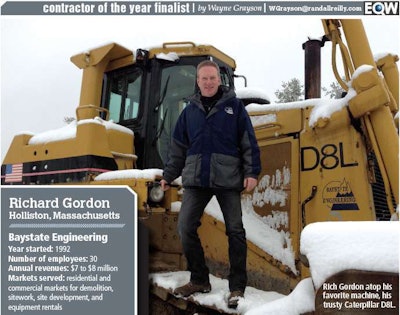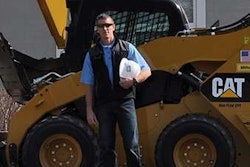
Richard Gordon grew up in the operator’s seat. He’s been operating equipment since he was a kid, running skid steers around in the yard, the machine a capable extension of his curious and active mind. As he grew up in South Windsor, Connecticut, he spent his summers working as a laborer and equipment operator before heading to Syracuse University to pursue a degree in management.
“Equipment site work and construction is in my blood. I’m the kind of guy that likes to work with my hands. And I love the equipment. I was never going to be a mechanic but I always loved operating,” Gordon says.
Fast forward to today and Gordon still makes time to hop in the cab every now and again, even though as the owner of Baystate Engineering, Holliston, Massachusetts, his responsibilities venture far outside the operator’s seat. In the past few years he’s been in charge of leading approximately 30 employees and a business that brings in between $7 million and $8 million each year.
“I’ve spent thousands of hours in the seat of equipment and I can run it all,” he says. “I’ve always liked taking something that’s a mess or nothing at all and turning it into something.”
It’s a statement that not only describes Gordon’s passion for his profession, but also serves as an apt metaphor for how he’s approached the ups and downs of his career.
Right-sizing for success
After graduating from Syracuse with a degree in management, Gordon worked as a project manager and estimator for Boston’s Tremont Construction between 1988 and 1992. Gordon calls it a great experience that exposed him to a lot of big jobs and how to deal with unions. “But I always knew I wanted to be on my own,” Gordon recalls. “It was always limiting working for someone else.”
So in 1992 he started Baystate Engineering. For that first year he drove a dump truck for hire and looks back on that time as being as happy as he’s ever been in his career. In 1993 his first big job came along with a subcontract in the construction of a movie theater. Gordon bought a used backhoe and just three months and a lot of sun-up-to-sun-down work later, and made a significant profit.
Things moved pretty quickly after that. Gordon paid off his backhoe and his dump truck as well as a pickup he’d bought along the way. And after a job building a hotel that netted him another big profit, he bought a loader and an excavator.
“So I started loading up and that just kept parlaying into more work,” most of which was subcontract jobs with one or two general contractors, Gordon says. “I did realize that it was time to branch out and not put all of my eggs in one basket.”
Baystate grew quickly and within 10 years Gordon had more than 50 employees. But after a subcontracted building a local high school went bad in 2004, Baystate took a big hit financially. Looking back, Gordon says he had gotten too big. “I was taking work for the sake of just taking it, to keep it all going,” he says. “Nobody gave me a dime ever. I built this myself. I was a type-A workaholic. I was feeding the fire.”
After losing a large sum to the job after it went south, Gordon didn’t declare bankruptcy or avoid those who he had done business with or owed money. Instead he reevaluated and downsized his business. He got rid of equipment he didn’t need, restructured the company and put an emphasis on communication.
“It’s tempting to go after more work. But I think back to my biggest year in business when I did $12 million and made no money,” he says. “So bigger isn’t necessarily better. And having more guys means paying more hours. Without proper management it becomes difficult to continue growing.”
The formula worked well. He has half as many employees as he did at the company’s peak workload, but through managing his company’s size and keeping the load reasonable, he returned to profitability.
“The biggest thing I learned during that entire experience was communication. I was on the phone every day,” Gordon says. “I’d go to people’s offices and work with them until I came out of it completely. I paid every person every single dime and I’m so proud to say that. And all those vendors that were my vendors at the time, they’re still my vendors.
“The biggest advice I can always give is you’ve got to communicate. You cannot close down. If you shut down and stop returning calls, you’re done. You’re done financially and in your reputation.”
An admitted equipment junkie
These days, Gordon spends a lot of time networking and marketing for Baystate. During our interview he took at least five phone calls and patiently spoke with each person on the other end, answering their questions, asking how they had been and promising to quickly address any concerns they had. “Service is everything. I’m a proactive thinker rather than a reactive thinker,” he says. “There are plenty of other great guys out there to do this work so a lot of it comes down to service.”
Gordon says the biggest challenge he faces managing the business is the week-to-week shuffle of manpower. “Coordinating manpower to jobs and making that equation work to keep the general contractor happy all the time is the big one,” he says. “Finding equipment isn’t an issue because I have a lot of it. But keeping all that equipment running is a bit of a challenge.”
Speaking of equipment, it wasn’t until around seven or eight years ago that Gordon was able to “turn the corner,” as he puts it, and fight the urge of spending the majority of his time in the operator’s seat. But that’s not to say he’s not still tempted. He satiates the urge with fill-in and demo work whenever he can.
“I still get on a job and think ‘Gosh, I gotta go jump in a machine,” he says. “To this day when a building needs knocking down I’m the guy that hops in the machine and knocks it down. So I still do spend at least some time operating the equipment.”
Besides, Gordon says moving dirt actually helps him deal with the stress of the business side. “I don’t need a shrink, I need a day in the D8.”










